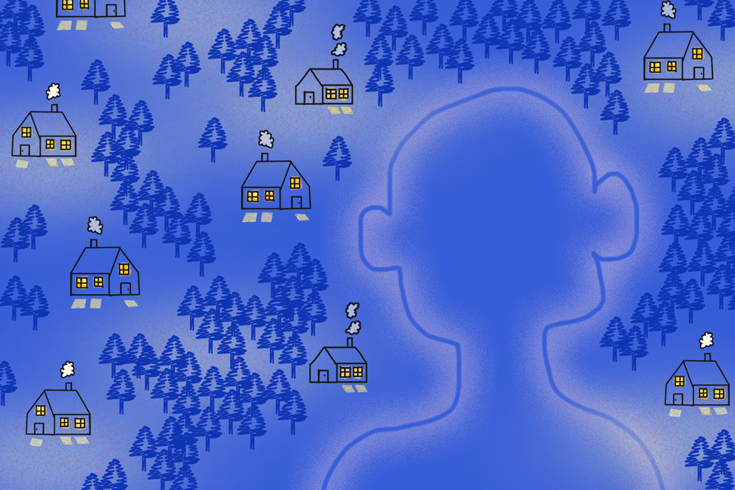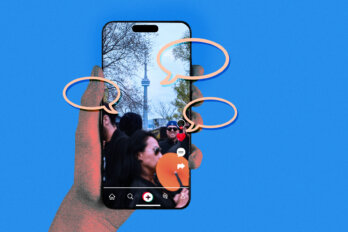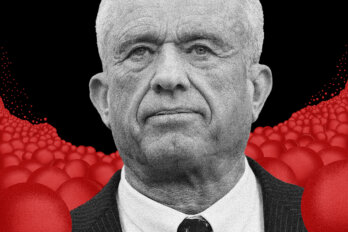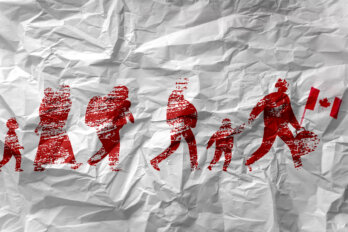In the simmering June heat, unusual for Whitehorse, the ravens looked soft and oily in the bluing late-night sun. I remember a pair of them perched on a lamppost, watching the ruckus on the bar patio, where I was standing with a rag tucked into my belt, a dirty pint glass in one hand, and a man looming over me, cursing me out because I’d had the audacity to cut him off.
“You ugly dyke. You grumpy bitch!”
I was the only server working on that busy solstice holiday. With my voice even, my heart hammering, and my hands up, I tried to calm him down. I had asked him to pay up and leave because he had become loud and aggressive, starting a one-sided argument with a table of southerners nearby.
“Shave your goddamn armpits, you hairy c—”
I have worked in bars—swinging liquor, cleaning up vomit, mopping dirty floors—for fifteen years. During that time, I’ve learned that drunk people do not say and do things they would never do sober—drunk people say and do things they are afraid to do sober. This man meant every word of the misogynistic, homophobic vitriol he was spewing at me. His disgust for my body—unshaven and without makeup, transgressing his idea of an assigned-female body—was real. It dripped down his chin and flew in flecks from his whisky-pursed mouth.
“You’re disgusting! Fucking shave!”
It was a full house; there were around forty people, many of them locals, within earshot. People stared into their drinks. Some looked down at their plates. Others continued their conversations at a louder volume. Queer and nonbinary folk will recognize this scenario because too many of us have a version of this story. This silence, this approval by virtue of inaction, means: some bodies are worth more than other bodies.
This kind of valuation is certainly not specific to the Yukon or to the queer community. But, when no one said anything or even looked at me, they chose to abandon one member of their community in favour of another. This moment is a snapshot of my complex relationship with the Yukon: even while I struggle with its sometimes isolating social and political norms, this place—and its landscapes—have deeply shaped my queer identity.
On the surface, the Yukon is a pretty queer-friendly place, with a small but active and well-recognized LGBTQ community. I’ve lived here for eight years, and for the most part, I have been warmly received despite often feeling isolated from the largely southern urban queer community. Even so, my colleagues and I have talked about how I might be the only openly queer, nonbinary journalist working in the Yukon, which gives me a certain responsibility when writing about the place. My queerness has never been an issue—as a journalist or as a server—for my employers or colleagues, and my writing has largely been encouraged by the Yukon’s artistic networks. But we tend to surround ourselves with people who agree with us. I struggle daily to align the accepting attitudes of my peers with some of the beliefs and values of the broader population.
The past three years have seen a series of backlashes against queer folk in the Yukon. In 2017, the city of Whitehorse painted a pride rainbow at a main downtown crosswalk only to have it vandalized days later. The following year, a trans pride flag was repainted at the same intersection; it was met with contemptuous, transphobic remarks even as it was being applied. Several months later, an openly transgender resident was physically attacked in the same area.
Last April, a group of LGBTQ students and allies asked the territorial government to ban conversion therapy in the Yukon. Rather than bringing the issue before the legislature immediately, the government’s response was to add a question about conversion therapy to a survey about queer inclusion in the Yukon, ostensibly part of a “community engagement” initiative meant to help create a more inclusive territory. But it took nearly a year for the issue to be revisited and the Sexual Orientation and Gender Identity Protection Act to be tabled—and it’s not a given that the bill will pass when the territorial legislature reopens in October. Ontario, Nova Scotia, and PEI already have conversion therapy bans in place, and a federal ban was proposed in March, a year after the Canadian government declared the issue a provincial and territorial responsibility and initially declined to act on it themselves.
The Yukon as we know it today was founded on resource extraction, colonialism, and the exploitation of Indigenous peoples and the environment for the benefit of white settlers. The history of the Klondike gold rush has been glorified, sanitized, romanticized, and sold to tourists and locals alike through plaques commemorating the era and busts of white so-called heroes on street corners. This history is embedded in contemporary Yukon culture, smouldering beneath the surface of our interactions and emerging more explicitly in bush-camp and mining culture. Females—predominantly Indigenous women and girls—can be particular targets for violence and discrimination in these places. Being queer or nonbinary makes someone even more vulnerable as homophobia tends to be prevalent in the culture of resource extraction.
Despite all of this, I want to say, definitively, that I love the Yukon—a love that keeps me here despite the brutal housing shortage, the long distance from my southern friends, and the dark, bitter winters that can send me into tailspins of depression. With a population of about 40,500 people spread out over an area slightly smaller than Spain, the whole territory feels like a quirky small town. It’s the sort of place where people will stop on the highway to help you change a flat tire; where a lost dog will be taken in and cared for by a stranger until their owner can be found; where it is impossible to go to the grocery store without seeing someone you know. Yukoners are, by and large, really good people who look out for one another. Part of really loving something, though, is being willing to look at it with clear eyes and accept the flaws you find.
When I first moved here, in 2012, I had never seen real wilderness before. I came up from a short stint in Toronto, where I had washed up after an inglorious postuniversity gig as a ranch hand in Alberta. I never felt quite at home in the city, where the long list of identity categories seemed so rigid that it felt impossible to define myself. But, in the boreal, locked between the tundra, the coastal rainforests, and the prairies, I found a landscape as varied and seemingly borderless as my own gender now feels.
I was very poor when I came here: my tourism job didn’t offer me enough hours, and housing and food were expensive. But I had time and access to land and water, and so, as a cost-saving measure—and a way to pass the days with few friends around—I taught myself to fish. That first summer, I subsisted almost exclusively on brown rice, lentils, and grayling (a small member of the Salmonidae family and a species native to the North), with the odd rainbow trout or Kokanee salmon thrown in for variety. I would hike into the backcountry, up sage-covered clay cliffs, to access pocket lakes full of whitefish or prowl along alder-laced rivers for grayling. I learned to engage with the land and water in a way I never had before. My body became a tool that I used for my strength and pleasure, my labour bearing fruits that I could also gift to others. In doing these things, I learned to engage and relate to my body beyond my gender.
Despite the closeness I’ve developed with myself and my body, sometimes I still feel lonely. I wish there were more queer people around—I miss talking to queer people without feeling like I have to talk about being a queer person. I also don’t always feel safe. I think that’s a fairly universal feeling for trans and queer folk, but sometimes, especially when I’m out in the bush picking mushrooms or fishing and I run into a certain kind of man—the kind that might say he doesn’t “believe” in queer people, that doesn’t like “faggots” because one hit on him once, that stands too close and is too large and refuses to acknowledge my pronouns—I get nervous. I look around at the miles and miles of boreal forest, the seemingly endless rivers and lakes, and think of all the places my body could be hidden and left to decompose. Other times, I’m afraid of the quiet, usually empty streets I walk home down when the bars close. I worry that I’ll lip off to the wrong person and find them waiting for me in the back alley. I’d like to think that, if someone heard me yelling, they would come, but then I think about the silence of the people in that barroom and I can’t be sure.
But, even as I sometimes feel isolated from southern Canadian LGBTQ communities, my self-concept wouldn’t be possible without this place—both its deprivations and its pleasures. It’s only very recently that I’ve begun to openly refer to myself as a nonbinary, or enby, person. Two years ago, I learned that I could ask for they/them pronouns and use them in my writing, but I avoided doing so because I didn’t want to be an inconvenience or damage my career. It was hard to claim my feelings about my body in this way, without having participated in urban trans and nonbinary communities.
When it comes to nonbinary and trans representation, the majority of the experiences I read about and see in media are largely urban. Sometimes I find myself curiously resentful of urban queers for their numbers and visibility. Their lives are not always representative of my own—part of the reason I lacked the language to describe myself was because of a dearth of exposure to people like me—and sometimes I worry they will question my authenticity because of it.
When I see nonbinary folk tweet back and forth at one another, for example, I feel disconnected from their experiences and unfamiliar with their language. There is too much that I feel I am already supposed to know; I am afraid to ask for clarification because I might be found wanting, or worse, deemed inauthentic. Once, while trying to explain these feelings to a visiting southern nonbinary person, I was told that it’s my responsibility to google the language southern queer communities use. This assumption reinforces the idea that the dominant image of nonbinary selfhood, which has largely evolved in an urban context, is the only legitimate way to be nonbinary.
LGBTQ communities have long been equated with urban communities. Although these ideas are beginning to change, there is still the accompanying fear, real or perceived, that we—queer and nonbinary people—will not be accepted in rural and remote communities. But I believe that, when queer and nonbinary people “give up” rural spaces in favour of urban ones, we cede territory to exactly the type of bigot that does not want us around in the first place. I may not get to be part of the events and conversations of larger, urban queer communities, but my very existence in rural and northern spaces is a revolutionary act.
Among a portion of the population here in the Yukon, there is an idea that, in order to be a “real Yukoner,” you need to have lived here for a long, usually undefined amount of time—“decades” is a common answer—with the only “true” Yukoners being “BnRs,” a colloquialism meaning born and raised. Because I did not grow up here, some Yukoners are bound to feel that my experiences about this place will never be truly valid.
This attitude might be one of the most damaging forces in the territory not only for queer and nonbinary folk but for the way all of us treat others, ourselves, our cities, and our environment. The idea that the Yukon was perfect at a certain time—whether or not that time is its original colonial founding—and that anyone or anything new represents a corruption is deeply embedded in the territory’s cultural psyche. Often, the first question lobbed at you in an argument is, “How long have you lived here?” The attitude often gets weaponized against ideas that involve change, physical or social.
But I am a Yukoner. Moreover, my connection to this territory has made me feel more myself, more in touch with my queer identity, than any other experience in my life. The land knows who I am, and this is a tremendous gift, but it’s one that has come with a price of isolation.
There are undoubtedly some things about the Yukon that need to change, and I am going to work to make that change happen. That’s what you do when you love and believe in something: you persist. You put the work in.




